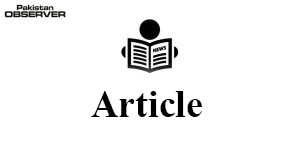Islamophobia: Philosophical and academic challenges
NEEDLESS to say that universities are the main avenue of knowledge creation to enrich intellect, inspire dialogue, provide thoughtful leadership and motivate actions to shape societies for their better existence.
Recently, the University of Okara conducted an event to deliberate on “Understanding and Controlling Islamophobia through Education” in Lahore on 28th of June, 2021, in a local hotel.
More than a dozen Vice Chancellors, leading journalists and different speakers from academia participated on the occasion. Indeed, the credit goes to the Vice Chancellor University of Okara for this event.
During the discourse, people from different walks of life shed light on the emerging phenomenon of Islamophobia, its better understanding and initiation of an alternative model to counter it through dialogue and research in education.
It is a well known fact that knowledge is a sole source of economic prosperity, building ideology and growth from the shackles of financial and social depravity.
The diverse socio-economic growth in the knowledge economy resides in the individuals who are equipped with an unprecedented mobility and freedom in current times.
The Muslim world, which is relatively less developed in its global outreach has been in the process of political, social and economic transformation, is also plagued by ever new challenges including poverty, inequality, poor governance and population explosion.
Miseries in Syria, Palestine and Kashmir, terrorism in our backyard are also the serious issues to be addressed by the academic world.
The world, on the whole is facing myriad of challenges in maintaining a global order. These problems are magnified manifold in the Muslim majority countries including Pakistan.
External players have had role in destabilizing Muslim states but the greater challenge is of internal nature.
On the external front, it is hard to defend the devastation unleashed on the Muslim countries in the name of Islamophobia, modernity and the West driven models developed by the global powers.
When we look at the very nature of these issues faced by the Muslim world; some problems are global, some are local and some are glocalised.
The rapid transformations taking place in the societies demand serious deliberations by the academicians in using the tool of knowledge.
The primary focus of the academia should be rectification of the false image of Islam and its values. Islam is a religion of peace and humanity.
But, unfortunately, radicalization screened and occurred during the last three decades or so has greatly tarnished its image.
In fact, the vast majority of Muslim world is ill-prepared to address this issue in the present war waged at a massive global scale.
The only way to defeat and win this war is through the construction of the Third Perspective, emerging from a critique of the two existing perspectives of the warring parties, this being preeminently a historic task of the academia of the Islamic world in particular, and of the non-Western world in general.
Following could be read as the main features or takeaways for evolving the Third perspective:
(i). The current was is the outcome of the deepening crises in the Muslim world. That was first realized in the last quarter of the 20th century.
(ii). The war is actually is a war of ideas fought with the weapons of terror between the two paradigms of thought, namely; the modernist and the religious, represented by the western world and the radical Muslims, respectively.
(iii). The warring perspectives are founded on the assumptions that modernity and tradition, science and religion, and by implication, past and present are mutually exclusive, and essentially lacking any connection, assimilation, effacing any possibility of co-existence.
iv. Overwhelmingly, the large majority of the Islamic world lives in both world of modernity and religion.
They seek a reconciliation that manifests the need for balanced societies. The misplaced notion of Islamophobia is hindering the actual and real message of Islam.
This concoction is furthering the differences and disintegrating the socio-cultural and economic relationship between the West and the Muslim world.
Inevitably, the Muslim academics should come forward to combat this misrepresentation and fallacious design through academic deliberations and alternative perspective.
It is pertinent to mention that the borrowed wisdom cannot address the issue and challenges faced by the Muslim world as it lacks the roots and theological social foundation of the Muslim world and may fail to contextualize them accordingly, in order to reach a conclusive paradigm.
We need to evolve an indigenous model of economic and political development as promoting democracy with weak political parties can be quoted in this respect, as one of the factors of failure of Western models of democracy in the Muslim world.
The growing complexities of international political scenarios necessitate an in-depth understanding and research, based on empirical analysis to devise policies for addressing these issues.
The epistemological and pedagogical tools developed earlier in previous centuries are still considered by and large, the basis of knowledge in the Muslim world.
The intellectual leaderships are not abreast with the evolving and dynamic transformation which is having its sway in the contemporary world.
No serious debate has been carried out to synthesize and creating compatibility between the two diverse models except Ghazali and Iqbal.
Since 12th century, the fountains of knowledge are dying out in the Muslim world because of the tension mounted between theological discourse and scientific paradigms.
Hence, there is an urgent need to re-contextualize and reorient the existing Western models of knowledge in the Muslim world to counter the onslaught of Islamophobia being perpetuated by the Western based intellect.
Moreover, the existing educational models being practiced in the Muslim world must be reviewed and tailored to conform to the prevalent modern epistemologies, while retaining the essence of Islamic theological foundations and practices.
—The writer is visiting Professor at Islamic University, Bahawalpur.










